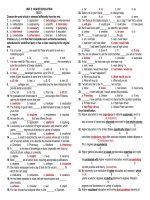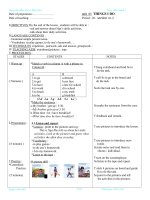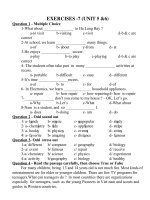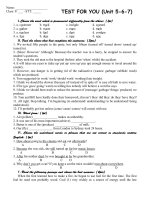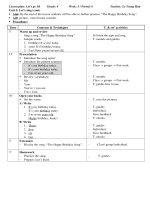- Trang chủ >>
- Đại cương >>
- Toán rời rạc
Unit 5 6 E12
Bạn đang xem bản rút gọn của tài liệu. Xem và tải ngay bản đầy đủ của tài liệu tại đây (102.77 KB, 10 trang )
<span class='text_page_counter'>(1)</span><div class='page_container' data-page=1>
<b>UNIT 5 : HIGHER EDUCATION</b>
<b>I. Pronunciation:</b>
1. A. apply B. identity C. university D. early
2. A. choice B. achieve C. each D. chemistry
3. A. examination B. application C. final D. decision
4. A. course B. certificate C. applicant D. education
5. A. information B. admission C. graduation D. demonstration
<b>II. Stress:</b>
1. A. university B. application C. technology D. entertainment
2. A. mathematics B. engineering C. scientific D. laboratory
3. A. certificate B. necessary C. economy D. geography
<b>III. Choose the best answer.</b>
1. It is a course _______ two years for those who want to work as a marketing agent.
a. of b. in c. for d. with
2. You can meet Mr. Pike, who is _______ behalf _______ the university to solve the problems of
foreign students.
a. on / of b. in / for c. with / at d. for / at
3. In most _______ developed countries, up to 50% of _______ population enters higher education
at some time in their lives.
a. Ø / the b. the / a c. Ø / Ø d. the / Ø
4. _______ colleges and _______ universities are the main institutions that provide tertiary
education.
a. The / Ø b. Ø / the c. The / the d. Ø / Ø
5. He graduated with doctorates of _______ and surgery from Florence, gaining the highest honors
that year.
a. medicine b. medical c. medicate d. medication
6. The making of good habits _______ a determination to keep on training your child.
a. require b. requires c. requirement d. required
7. He was the only _______ that was offered the job.
a. apply b. application c. applicant d. applying
8. A university is an -institution of higher education and research, which grants _______ degrees at
all levels in a variety of subjects.
a. secondary b. optional c. academic d. vocational
9. _______ is used to describe the work of a person whose job is to treat sick or injured animals, or
to describe the medical treatment of animals.
</div>
<span class='text_page_counter'>(2)</span><div class='page_container' data-page=2>
10.A _______ is an area of knowledge or study, especially one that you study at school, college, or
university.
a. degree b. subject c. level d. vacancy
11.Most _______ are at senior level, requiring appropriate qualifications.
a. degrees b. grades c. colleges d. vacancies
12.She reads newspapers every day to look for the vacant _______ for which she can apply.
a. institutions b. indications c. positions d. locations
13.He had been expected to cope well with examinations and _______ good results.
a. achieve b. consider c. last d. object
14.You can choose four subjects either in Arts _______ in Sciences.
a. nor b. or c. and d. as
15.Either you or your friend _______ on charge today.
a. are b. is c. was d. were
<b>IV. Reading:</b>
The year at an American college is divided into two semesters or three quarters. A semester
includes 15 weeks; a quarter includes 10 weeks. American college students usually go to school from
September to May. They can also study during the summer.
Students choose their classes a few weeks before the start of each term. Universities and colleges
offer a great many classes in the students’ main areas of study and in other areas as well. Students
must take both. These include science, math, computer, history and English. Other classes such as
dance, theater, or sports may be just for fun. Tests are usually given in the middle of the term and at
the end. The final exam is extremely important. In some classes, the professor asks the students to
write a research paper or complete a certain task instead of taking a test.
Classes at an American college are usually organized through lectures. For example, a student may
attend two or three lectures a week by one professor. There may be as many as several hundred
students at each lecture.
<b>1. Which of the following is NOT true according to the passage? </b>
<b>A. The year at an American college usually starts in September. </b>
<b>B. The year at an American college is divided into two semesters or three quarters. </b>
<b>C. There are 15 weeks in each semester and 10 weeks in each quarter. </b>
<b>D. American college students never study during the summer. </b>
<b>2. American college students choose their classes ______. </b>
<b>A. in the first week of each term </b> <b>B. at the end of each term </b>
<b>C. at any time during the term </b> <b>D. before the start of each term </b>
<b>3. Which of the following courses is NOT mentioned in the passage? </b>
<b>A. Science. </b> <b>B. Medicine. </b> <b>C. History. </b> <b>D. Dance. </b>
<b>4. Usually, an American college student takes ______ tests in a term. </b>
<b>A. two </b> <b>B. five </b> <b>C. four </b> <b>D. three </b>
<b>5. The final exam is ______. </b>
</div>
<span class='text_page_counter'>(3)</span><div class='page_container' data-page=3>
The Korean education system basically consists of primary schools, ...(0)... schools, high
schools, and colleges ...(1)... universities, with graduate courses leading to Ph.D. degrees. ...
(2)... education is compulsory for children aged six ...(3)... eleven. The basic primary school
curriculum is generally divided into eight ...(4)... : the Korean language, social studies,
science, ...(5)... , ethics, physical education, music and fine arts. Students in secondary schools
are required to take a number ...(6)... additional subjects, such as English, and can take electives,
...(7)... as technical or vocational courses. Afterwards, students can ...(8)... between general
education and vocational high schools. ...(9)... general, high school tends to be strict, as college
and university admission is very competitive.
<b>0: A. second </b> B. secondary C. among D. half
<b>1: A. as </b> B. or C. but D. so
<b>2: A. Primary </b> B. High C. College D. University
<b> 3: A. from </b> B. for C. with D. to
<b> 4: A. subjects </b> B. courses C. topics D. titles
<b> 5: A. mathematician </b> B. mathematics C. mathematically D. mathematical
<b> 6: A. of </b> B. with C. for D. to
<b>7: A. so </b> B. such C. like D. alike
<b>8: A. choose </b> B. test C. wish D. consist
<b>9: A. On </b> B. In C. Of D. For
<b>VI. Choose the best answer.</b>
<i>1. I didn't have an umbrella with me, so I got wet. </i>
A. If I had had an umbrella, I wouldn't get wet.
B. If I had had an umbrella, I would get wet.
C. If I had had an umbrella, I wouldn't have got wet.
D. If I had had an umbrella, I would have got wet.
<i>2. ______, we couldn't have continued with the project. </i>
A. Unless we had your contribution B. Provided your contribution wouldn't come
C. Even if you didn't like to contribute D. If you hadn't contributed positively
3. If I had the map now, I ______ a short-cut across the desert.
A. could have taken B. take C. can take D. could take
5. We'll be late for the meeting ______.
</div>
<span class='text_page_counter'>(4)</span><div class='page_container' data-page=4>
A. If B. Unless C. Because D. When
7. If the weather ______ worse, we won’t go to the beach.
A. will get B. got C. gets D. would get
8. If I had time, I _____ to the beach with you this weekend.
A. will go B. will have gone C. would have gone D. would go
<i>9. _______, he would have learned how to read. </i>
A. Had he been able to go to school as a child
B. If he has been able to go school as a child
C. If he could go to school as a child
D. Were he able to go to school as a child
<i>10. My friend told me, “If I were you, I would not smoke so much.” </i>
A. My friend prohibited me from smoking so much.
B. My friend suggested not smoking so much
C. My friend warned me against smoking so much.
D. My friend advised me not to smoke so much
11. If she ______ sick, she would have gone out with me to the party.
A. hadn’t been B. weren’t C. hasn’t been D. wasn’t
12. She will be ill ______.
A. in case she takes a few days’ rest B. if she takes a few days’ rest
C. provided she takes a few days’ rest D. unless she takes a few days’ rest
13. If she _______ rich, she would travel around the world.
A. would be B. is C. has been D. were
14. If you had taken my advice, you _______ in such difficulties.
A. won't be B. hadn't been C. wouldn't be D. wouldn't have
been
15. My cat would not have bitten the toy fish _______ it was made of rubber.
A. if she has known B. if she should know C. had she known D. if she knew
16. They will stay there for some days if the weather _______ fine.
A. would be B. was C. is D. will be
</div>
<span class='text_page_counter'>(5)</span><div class='page_container' data-page=5>
18. If I had enough money, _____.
A. I will buy that house B. I could buy that house
C. I can buy that house D. I would have bought that house
19. Unless you don't study harder, you won't pass your exams.
A B C D
20. Were I a millionaire, I ... around the world.
A. will travel B. would travel C. would have traveled D. won't
travel
21. ... I have time, I will come to see you.
A. Should B. Were C. Had D. Would
22. Had she followed my advice, she ... her way.
A. would have lost B. will lose C. would lose D. wouldn't have lost
23. The world's population will continue to rise ______ we don't do anything about it.
A. if B. unless C. however D. how
24. I ______ any classes if I were you.
A. didn't miss B. wouldn't miss C. won't miss D. don't miss
25. If I had more money, I ______ a bigger house.
A. will buy B. would buy C. bought D. would have bought
26. You won’t pass the exam ______ you study harder.
A. unless B. if C. despite D. because
27. If you drank less, you will feel much better.
A B C D
28. If we had asked her, ______.
A. she would sing a song to us then B. she would have a song to us then
C. she will have sung a song to us D. she would have sung a song to us
29. If you ______ John, tell him I'll phone him later.
A. saw B. see C. has seen D. were seeing
30. If I _____ ten years younger, I would do yoga everyday.
A. are B. am C. have been D. were
31. “If I were you, I would go to see the doctor”, David said to Claudia.
A. David advised Claudia not to go to see the doctor.
B. David advised Claudia to go to see the doctor.
C. David told Claudia that he would go to see the doctor.
D. David told Claudia to become a doctor.
</div>
<span class='text_page_counter'>(6)</span><div class='page_container' data-page=6>
A. If Barbara has worn the raincoat, she won’t get a cold.
B. If Barbara wore the raincoat, she wouldn’t get a cold.
C. If Barbara had worn the raincoat; she wouldn’t have got a cold.
D. If Barbara worn the raincoat, she didn’t get a cold.
<b>---UNIT 6 : FURTURE JOBS</b>
<b>I. PRONUNCIATION:</b>
1. A. interview B. minute C. question D. suitable
2. A. explained B. disappointed C. prepared D. interviewed
3. A. vacancy B. category C. wholesale D. retail
4. A. thought B. though C. through D. enough
<b>II. STRESS :</b>
1. a. interview b. impression c. company d. formally
2. a. stressful b. pressure c. prepare d. future
3. a. employment b. remember c. concentrate d. position
4. a. express b. effort c. office d. comment
5. a. advice b. relate c. during d. forget
<b>III. VOCABULARY:</b>
1. I was so ... that I couldn't say a word.
A. nerve B. nervous C. nervously D. nervousness
2. Her job was so ... that she decided to quit it.
A. interesting B. satisfactory C. stressful D. wonderful
3. It is of great importance to make a good impression ... your interviewer.
A. on B. about C. for D. at
4. Qualifications and ... are two most important factors that help you get a good job.
A. politeness B. experience C. attention D. impression
5. Many people will be out of ... if the factory closes down.
A. job B. career C. work D. profession
</div>
<span class='text_page_counter'>(7)</span><div class='page_container' data-page=7>
A. work B. employment C. career D. job
7. He has an ... next week for the manager's job.
A. interview B. interviewer C. interviewee D. interviewing
8. He is an ... teacher. He has been teaching English for more than 20 years.
A. experience B. experienced C. inexperienced D. experiences
9. During the interview you should concentrate ... what the interviewer is saying.
A. in B. about C. on D. with
10. The doctors are worried ... the possible spread of the disease.
A. of B. for C. from D. about
<b>IV. WORD FORM: </b>
<i><b>Supply the correct form of the word in bold :</b></i>
1. We were ... aware of the danger. (keen)
2. She summarized her plan very ... ( neat)
3. Children living in inner city areas may be ... disadvantaged. (educate)
4. Faulty goods should be returned to the ... ( manufacture)
5. Put an ... in the local paper to sell car . ( advertise )
6. Some companies are fighting for ... of the software market. (dominate)
7. She shows a ... to work on her own initiative.
8. This is a highly ... product. ( market )
9. He resigned from the company in order to take a more ... job . ( challenge)
<b>V. Choose the best answer.</b>
1. He arrived late, ______ was annoying.
A. it B. that C. what D. which
2. He bought all the books ______ are needed for the English course.
A. that B. those C. what D. who
3. It's the English phrasal verbs _____ puzzle me most.
A. which B. that C. it D. they
4. This is the factory _____ my father used to work.
A. where B. what C. when D. which
</div>
<span class='text_page_counter'>(8)</span><div class='page_container' data-page=8>
A. travel B. to travel C. traveled D. traveling
6. He always wears clothes _____ are too small for him.
A. why B. what C. which D. where
7. The children, ... parents work late, are taken home by bus.
A. that B. whom C. whose D. their
8. She doesn't understand ... I am saying.
A. what B. that C. whose D. where
9. The place ... we spent our holiday was really beautiful.
A. what B. who C. where D. which
10. Peter works for a factory ... makes motorbikes.
A. what B. which C. who D. whom
11. What is the name of the girl ... bicycle was stolen?
A. whose B. who C. which D. when
12. The man ________we met yesterday was the manager of a bicycle factory.
A. when B. whose C. who D. which
13. Dien Bien Phu is the place _____ our army won a resounding victory in 1954.
A. where B. when C. what D. which
14. Alexander Fleming, ______, received the Nobel Prize in 1945.
A. that discovered penicillin B. who discovered penicillin
C. which discovered penicillin D. he discovered penicillin
15. The boy ______ eyes are brown is my friend.
A. who B. whom C. which D. whose
16. Yesterday I met your brother, ______ had taken us to the Headquarters of the United Nations in
New York before.
A. who B. whose C. whom D. that
17. Some writers can exactly describe things ______ they have never seen.
A. when B. that C. if D. who
18. The people ______ called me yesterday want to buy your house.
A. whom B. which C. who D. whose
</div>
<span class='text_page_counter'>(9)</span><div class='page_container' data-page=9>
20. Yesterday was the day ______ they celebrated their 21st wedding anniversary.
A. when B. then C. what D. which
21. In our school library, there are several large tables _____ we can sit to read books.
A. where B. that C. when D. which
22. This house, _____ he bought in 1990, is being repaired at the moment.
A. that B. which C. who D. what
23. He turned on the TV, ______I thought was rather surprising.
A. and B. so C. that D. which
24. Tears contain an antiseptic ______ helps protect our eyes from infection.
A. that B. what C. how D. where
25. The United States consists of fifty states, ______ has its own government.
A. each of which B. hence each C. they each D. each of that
26. Venice, ___ was built on water, is a city in Italy.
A. where B. that C. who D. which
<b>VI. TRANSFORMATION:</b>
1. The lock has now been repaired. It was broken
--> ...
2. Most of the people are very nice. They work in Peter's office.
--> ...
3. What is the name of the boy? He telephoned you.
--> ...
4. What's happened to the money? It was on my desk
--> ...
5. He's the man. He painted my house.
--> ...
6. The car has been found. It was stolen.
--> ...
7. She's the person. She gives me a lift to work every day.
<b>VI. Read the passage carefully and choose the correct answer.</b>
</div>
<span class='text_page_counter'>(10)</span><div class='page_container' data-page=10>
really true. The more you prepare and practice, the more comfortable you will feel. You should find
out as much as possible about the company before you go to the interview. Understand the products
that they produce and the services that they provide. It is also good to know who the customers are
and who the major competitors are. Practice makes perfect. It will also make you feel more confident
and relaxed. So, practice your answers to common questions. Make a list of questions to ask, too.
Almost all interviewers will ask if you have questions. This is a great opportunity for you to show your
keenness, enthusiasm, and knowledge.
Make a great impression. The interview is your chance to show that you are the best person for
the job. Your application or resume has already exhibited that you are qualified. Now it is up to you to
show how your skills and experience match this position and this company. The employer will be
looking and listening to determine if you are a good fit. He/she will be looking for a number of different
qualities, in addition to the skills that you possess. To make the best impression, dress appropriately;
express your strengths; arrive early, by about 10-15 minutes; be enthusiastic; shake hands firmly; be
an active listener; sit up straight and maintain eye contact; and ask questions
After the interview, follow up with a thank-you note. This is a chance for you to restate your
interest and how you can benefit the company. Your best bet is to try to time it so that the note gets
there before the hiring: decision is made. You should also follow up with a phone call if you do not
hear back from the employer within the specified time.
1. The pronoun it refers to ________.
a. the job b. the interview c. the interviewer d. the preparation
2. What does the writer advise you to practice?
a. Asking and answering questions related to the job.
b. Making products that the company produces.
c. Providing services that the company serves.
d. Meeting some customers and competitors.
3. Which should not be shown during your interview?
a. Punctuality b. A firm hand shaking
c. Being properly-dressed d. Weaknesses
4. You can show your qualifications in the
a. dressing style and punctuality b. competing with the competitors
c. resume and letter of application d. eye contact with the interview
5. Which is not included in the writer's advice?
a. You should not communicate with the interviewer after the interview.
b. You 'should make the best impression in the interview.
</div>
<!--links-->



